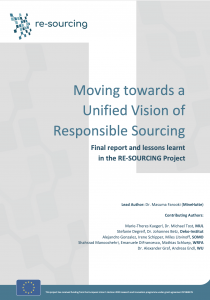Experts call for a united global vision, definitions and targets for responsible sourcing of green transition minerals
4-year EU-funded project offers roadmaps for key industry sectors, advice to governments, civil society; Takes special looks at Latin America, Africa, China
In its report, the four-year European Union3-funded RE-SOURCING project2 proposes adopting a global vision of a circular economy and reduced resource consumption by 2050 and outlines a series of interim milestones and targets for three key industrial sectors: renewable energy, mobility, and electric and electronic equipment.
The report (at https://bit.ly/3uqXlqT1) acknowledges that several firms and governments are showing leadership to address troubling global environmental, social and economic issues, including:
* Biodiversity and habitat protection, land, air and water pollution, climate change
* Access to clean water, air & health care, gender equality, human rights, respecting land rights, labour rights, and safeguarding the artisanal and small-scale miners
* Corruption and money laundering, promoting sustainable growth and development, and enabling national / local industrial development
At the same time, they underline that “the corporate behaviour that existed in the preceding century is no longer acceptable. More responsible and sustainable practices need to be undertaken and evidenced.”
The report adds that the underlying message from wide-ranging stakeholders is that “industry and its supply chains must incorporate and reflect societal values in their operations and business management” and “power imbalances, where they impede the ability of a group to affect the decisions that impact them, need to be addressed.”
Lead author Masuma Farooki says achieving responsible sourcing begins with a universally accepted definition, as well as commonly agreed targets for 2050:
1: A circular economy and decreased resource consumption
2: Meeting the Paris Agreement climate goals and environmental sustainability
3: Social sustainability and responsible production
4: Responsible procurement
5: Level-playing field and international cooperation
International cooperation, the report notes, means helping companies, regions, and countries improve practices and achieve agreed standards. A level playing field “is paramount for achieving all other targets.”
The report strongly underlines the need to address the power imbalance between local communities, workers and other affected stakeholders in decision-making, enabling their meaningful participation in decision-making.
Transparency is also fundamental. Consumers need to know how the elements of the products they buy are obtained, with adequate information to enable their choosing sustainably-sourced products.
The report provides specific roadmaps and recommendations for policymakers and companies in the renewable energy, mobility sector, and the electronic product sectors.
It also takes a special look at three regions:
Latin America mining projects can face particularly strong opposition from local communities. According to the Environmental Justice Atlas (EJAtlas 2023), 45% of reported conflicts worldwide are in Latin America, where projects are often located near sensitive, biodiverse ecosystems, many of which are home to vulnerable communities. A key regional priority, therefore, is “strengthening of social capital and civil society trust in the mining sector with focus on the local communities.”
African regional challenges include “trustful and transparent collaboration” by industry, local governments, and others. “If the mining sector, communities, supply chain and governments work together, the outlook for the industry on the continent will be bright”. Among other key considerations for Africa: supporting and improving artisanal and small-scale mining operations, which plays a crucial role in obtaining many raw materials essential for the green transition.
China, meanwhile, dominates the critical green-energy technology minerals supply chain with rising investments abroad. A recent report associated China, however, with over 100 human rights abuses, environmental harms, workers’ rights violations and other allegations over the past two years in Indonesia, Peru, Congo, Myanmar, Zimbabwe and other countries. It also notes China’s creation of guidelines to align companies’ due diligence with international standards and that similar allegations are made against mining operations linked to Canadian, USA, UK, Australian and European companies and investors.
In the end, the report cautions, “the findings just underline growing concerns that the green transition to renewable energy is repeating unjust business practices that have long dominated fossil-fuel and mineral extractions.”
According to the report: “The proposed RS framework is adaptable and allows for diverse pathways based on regional priorities. It aims to coordinate and consolidate various RS approaches without losing their unique features, providing a common destination while accommodating different speeds of progress.”
Funded under the European Union's Horizon 2020 program, the four-year project was coordinated by the Institute for Managing Sustainability at the Vienna University of Economics and Business Administration, assembled international partners within and outside the EU to create the RE-SOURCING Platform, including OEKO Institut (Germany), World Resources Forum Association (Switzerland), Montanuniversität Leoben (Austria), Tallinn University of Technology (Estonia), MineHutte Intelligence (UK), SOMO (Netherlands), WWF (Germany), EIT Raw Materials (Germany), Luleå University of Technology (Sweden, AHK Business Center (Chile) and SRK Consulting (South Africa).
Shahrzad Manoochehri
World Resources Forum
+41 71 554 09 00
email us here
Visit us on social media:
Facebook
Twitter
LinkedIn
Instagram
YouTube
1 https://bit.ly/3uqXlqT
2 https://re-sourcing.eu/
3 https://commission.europa.eu/index_en

